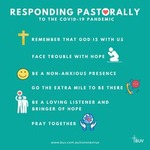24th September 2017
Introduction to Ethical Pastoral Leadership
When I was training for Pastoral ministry in South Australia in the 1980s, I was given the booklet, Above Reproach – written by Tony Cupit, then General Superintendent of the Baptist Union of Victoria. It was “a guide to the professional standards and ethics of the Baptist minister today.” Cupit notes that the only previous book on this in the Australian Baptist context came from New South Wales in the 1960s.
As you would expect, some of Cupit’s material sounds a bit quaint today. But there is a lot of wisdom in it that continues to be reflected in our current Code of Ethics for Pastoral Leaders. And Cupit’s opening comments express what is still a compelling reason for us to ensure we engage in ethical Pastoral practice –
“The Christian ministry is entrusted to those called by God to the work of reconciliation. A minister must commend that calling by the quality of his (her) life and his (her) commitment to pastoral care. No minister should knowingly act in such a way that will invite criticism of the ministry. Christian ministers should commend themselves as servants of God, with all the responsibilities that this implies… Because of the unique role they play in church and community, ministers have a wonderful opportunity to set an example of what it means to be a disciple of Jesus Christ.”
Over a century earlier, another Baptist leader, Charles Spurgeon, made the same point in his famous, Lectures to My Students. It is noteworthy that Spurgeon’s first lecture to ministry students was entitled, The Minister’s Self-Watch. It begins, “Every workman knows the necessity of keeping his tools in a good state of repair…”
It then continues, “We are, in a certain sense, our own tools, and therefore must keep ourselves in order….It will be in vain for me to stock my library, or organize societies, or project schemes, if I neglect the culture of myself; for books and agencies and systems are only remotely the instruments of my holy calling; my own spirit, soul and body are my nearest machinery for sacred service; my spiritual faculties and my inner life are my battle axe and weapons of war.”
He goes on to talk about the need for personal faith, vigorous piety; and good character. He comments, “The life of the preacher should be a magnet to draw people to Christ.” Notably, the “Prince of Preachers” also said, “our characters must be more persuasive than our speech.” He laments the story of the man who “preached so well and lived so badly, that when he was in the pulpit everybody said he ought never to come out again, and when he was out of the pulpit they all declared he never ought to enter it again.”
Both Spurgeon and Cupit point back to much earlier teaching on ethical practice for Pastoral leaders – Paul’s writing to Timothy. This includes, 1Tim 3:1, “Here is a trustworthy saying: whoever aspires to be an overseer desires a noble task. Now the overseer is to be above reproach,…S/he must also have a good reputation with outsiders, so that s/he will not fall into disgrace and into the devil’s trap.” And 1Tim 4:16, “Watch your life and doctrine closely. Persevere in them, because if you do, you will save both yourself and your hearers.”
To this we could add other Apostolic teaching such as 1Jn 2:6, “Whoever claims to live in God must walk as Jesus did.” Also the reminder in 1Pet 5 that we are to serve as “examples to the flock” that has been entrusted to our care.
These Apostolic calls to ethical Pastoral leadership, looks back to the foundational teaching of our Lord Jesus, who presented leadership in terms of serving others; identified love as the defining mark of discipleship; urged us to maintain our saltiness for mission; spoke of good trees bearing good fruit and so on.
I share all this background to make the point that ethical practice is not just another part of Pastoral leadership, but is central to it. So, as you seek to develop your theology, so be diligent in your living. As you seek to sharpen your skills, so seek to strengthen your character. As you seek to nurture your spirituality, so seek to live out the fruit of the Spirit. Professional Standards Workshops and Safe Church Awareness Workshops are designed to support Pastors and other church leaders in this.
Pursuing excellence in ethical leadership p is important at any time, but even more so at this time. We engage in Pastoral leadership in an era when the ethics of the Church are under significant scrutiny and suspicion. Our society doubts our integrity. We are all on trial in the court of public confidence.
In a speech to the 2017 Safe as Churches Conference, Chair of the Royal Commission, Justice Peter McClellan, said:
“The majority of the allegations we have received have emerged from faith-based institutions. This inevitably raises the question, ‘why’. Why is it that in institutions which proclaim faith in God and embrace the highest ethical and moral principles, so many children are abused? Why do some people who proclaim their faith and have accepted a life of religious endeavour, breach their obligations to children? Is there something in either the structure, culture, or personal qualities of members of the churches and other religious bodies, whether lay or ordained, that gives them such a prominent place amongst offenders?”
These are good questions that many are asking. Too many leaders and churches have breached the trust placed in us and we have a lot of work to do to regain the integrity required if we are to serve as the “salt and light” and “ministers of reconciliation” we are called to be.
As Pastoral leaders we play a central role in helping the Church to regain a place of trust in our society. For such leadership to be effective, it must be marked by integrity and love – being good and doing good. To quote Philip Yancey, Vanishing Grace, “A sceptical world judges the truth of what we say by the proof of how we live.” More than ever, our neighbours need to see our goodness before they hear the good news.
So, let us engage with Pastoral ethics not just as some rules to comply with; but as reflecting on how we can practise life and ministry in ways that honour the Lord we follow and commend life with him to others. This is central to discipleship and leadership. As Paul put it in Eph 4:1, it is about “living a life worthy of the calling you have received.” Our Code of Ethics for Pastoral Leaders was written to articulate this aspiration – reflecting Kingdom values and setting a standard we will be held accountable to in Church and society. Let us seek not only to comply with our Code, but to grow in excelling in the behaviours it calls us to aspire to.
Rev David Devine is BUV’s Head of Church Health and Capaicty Building, and Chair, BUV Professional Standards Group









